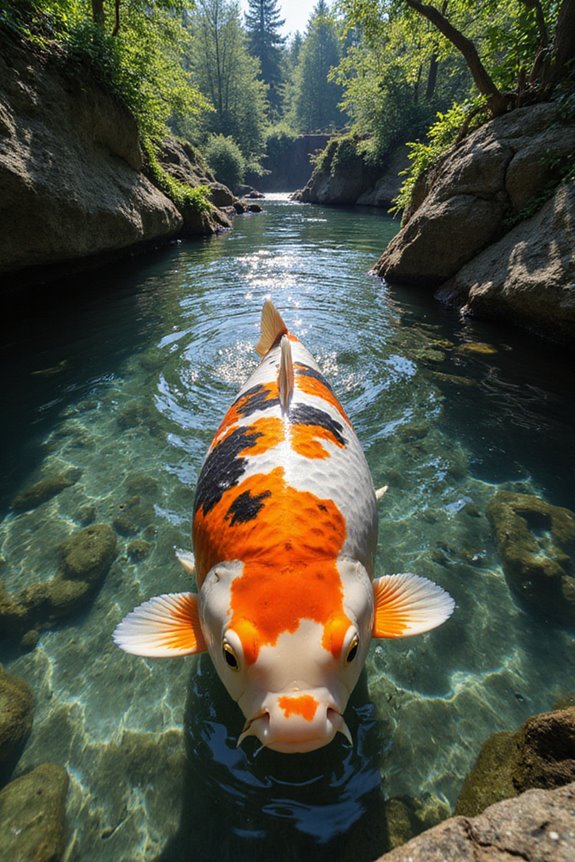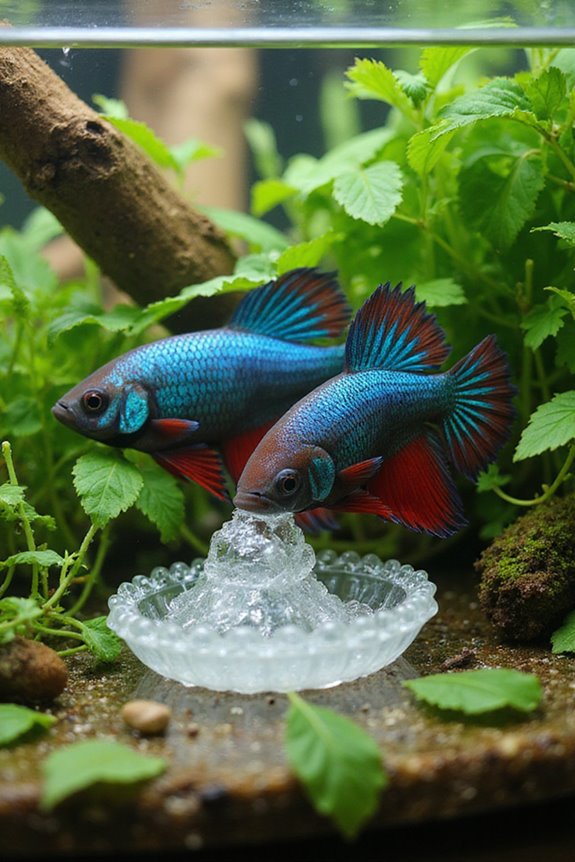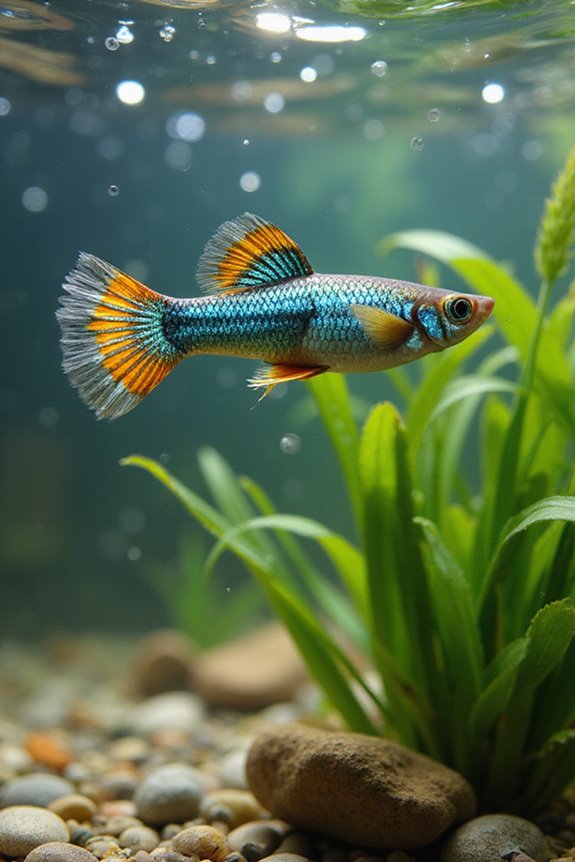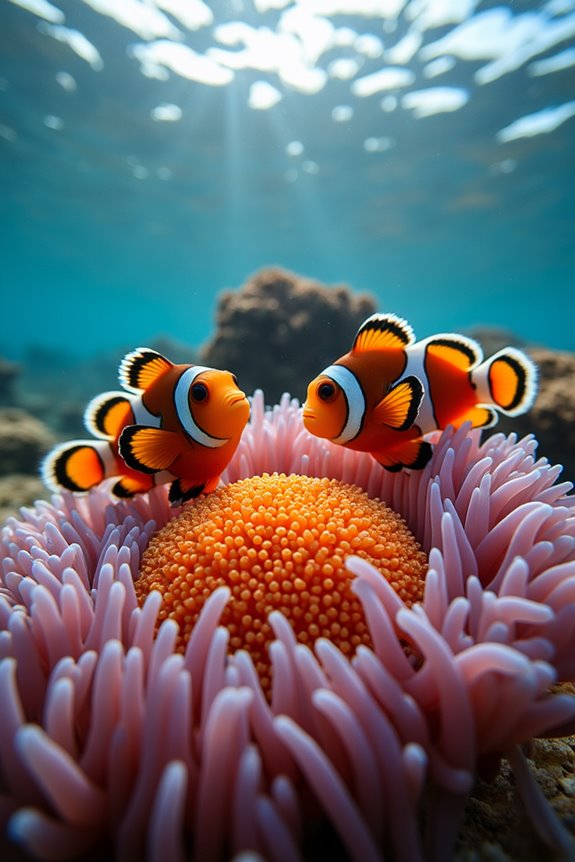Betta fish can generally survive without food for 10 days to 2 weeks, depending on their health and tank conditions. It’s important to maintain a clean, well-oxygenated tank with stable temperatures between 76-82°F to support their metabolism. Young bettas may not tolerate fasting as well as adults. If you plan to be away, consider asking someone to feed them or pre-measure portions. Keeping up with your betta’s care routine can help you avoid health issues during fasting times. Explore tips for better tank management and feeding practices.
Key Takeaways
- Betta fish can survive without food for 10 days to 2 weeks under healthy conditions.
- They can typically last up to 3 days without feeding in a well-maintained tank.
- Short fasting periods of 1-3 days can be beneficial for their digestive health.
- Fasting beyond 2 weeks poses serious health risks, including starvation damage.
- Ideal water quality and temperature are crucial for supporting their survival during fasting.
Understanding Betta Fish Nutrition
When it comes to keeping betta fish healthy, understanding their nutritional needs is fundamental. Betta fish thrive on a diet rich in protein, ideally around 28-35% digestible protein. You can provide quality protein sources like live insects, brine shrimp, and specialized pellets designed for bettas. These options not only enhance growth but also improve coloration and reproductive performance. It’s imperative to balance protein with energy sources, maintaining around 3,200 kcal/kg for ideal metabolism. Using dietary supplements, such as vitamins and color enhancers, can boost their immune response and overall health. Offering a variety of foods guarantees a well-rounded diet. Remember, a balanced approach to nutrition is key to keeping your bettas vibrant and healthy.
Survival Duration for Healthy Adult Bettas
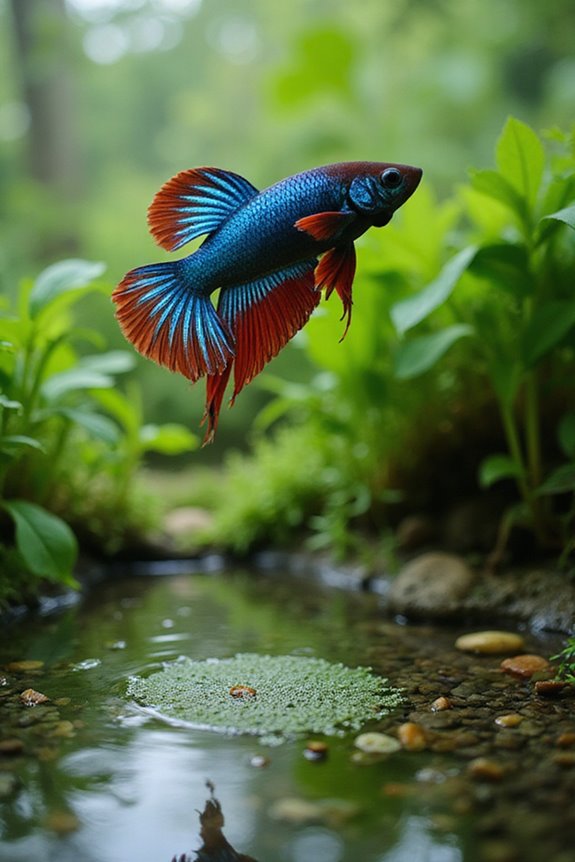
Understanding how long healthy adult bettas can survive without food is important for every aquarist. Generally, bettas can manage 10 days to 2 weeks without food, depending on their environment. In a well-maintained tank, lasting up to 3 days without feeding is usually safe. I’ve found that short fasts of 1-3 days can actually have fasting benefits, helping to maintain betta energy and digestive health. Regularly allowing brief fasting periods can even reduce fat storage and promote overall well-being. However, I wouldn’t recommend extending fasting beyond 2 weeks, as it risks starvation damage and can lead to serious health issues. Keeping water quality ideal during these times is essential for their resilience.
Factors Affecting Survival Time
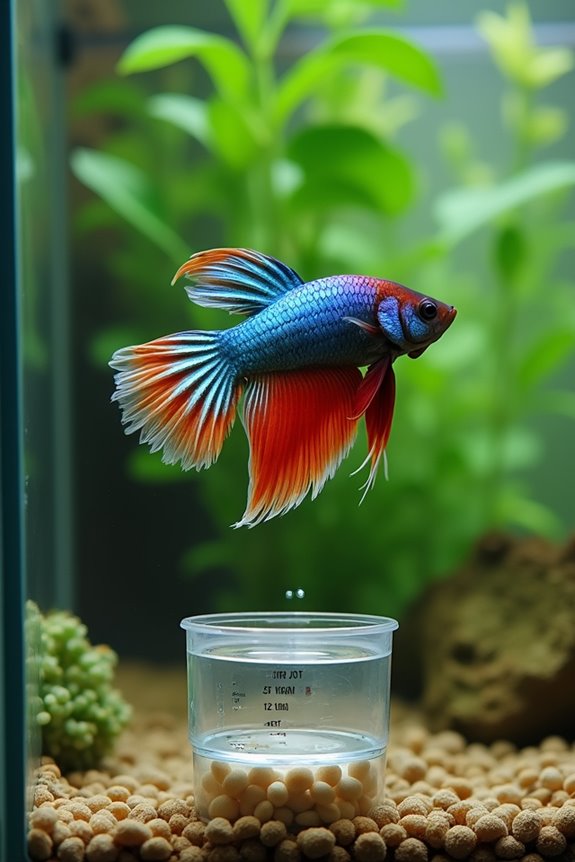
Several factors can markedly influence how long a betta fish can survive without food, each playing an essential role in their overall resilience. Age and health status are critical; younger bettas have lower fasting tolerance, while older or ailing fish struggle more. Maintaining ideal water temperature between 76-82°F (24-28°C) supports metabolism and aids fasting endurance. Clean water quality reduces stress, vital for their survival time. A stable tank environment, equipped with a reliable heater and filtration system, minimizes harmful compounds and stressors. Finally, a regular feeding schedule before fasting helps maximize energy reserves, while excessive disturbances can increase stress levels, further impacting fasting tolerance. Prioritize these factors to enhance your betta’s chances during food deprivation.
Physiological Effects of Starvation on Bettas
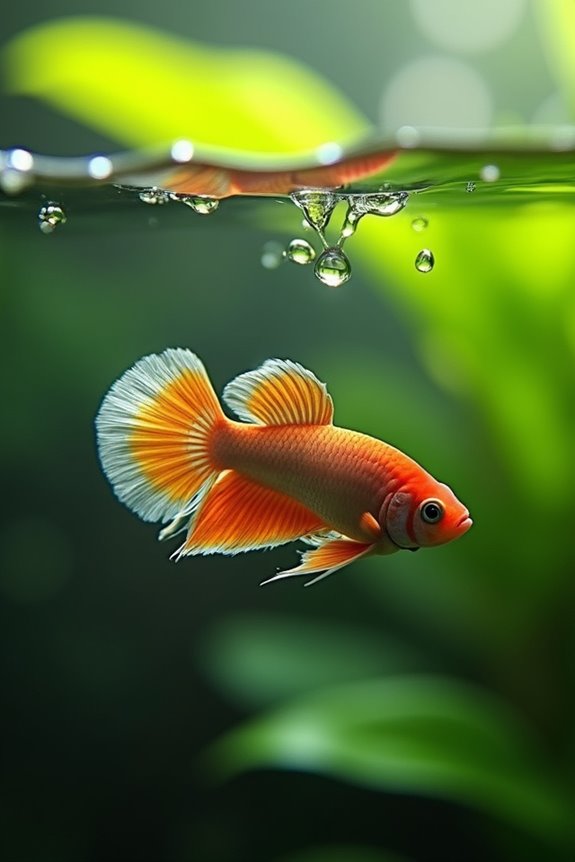
Starvation profoundly impacts the physiological well-being of betta fish, influencing their health and behavior in noticeable ways. Initially, energy depletion occurs as bettas tap into their stored reserves, leading to significant weight loss and weakness. Metabolic adaptations kick in, slowing their metabolism to conserve energy. During this time, I often observe starvation symptoms like lethargy and a dull appearance. Hormonal shifts can affect growth and reproduction, while the immune system weakens, increasing disease susceptibility. Stress levels rise, altering social behaviors and reducing activity. The combination of these factors can lead to long-term health issues and a shortened lifespan. It’s essential to guarantee proper feeding to prevent these adverse effects on our betta companions.
Recommended Feeding Practices During Absences
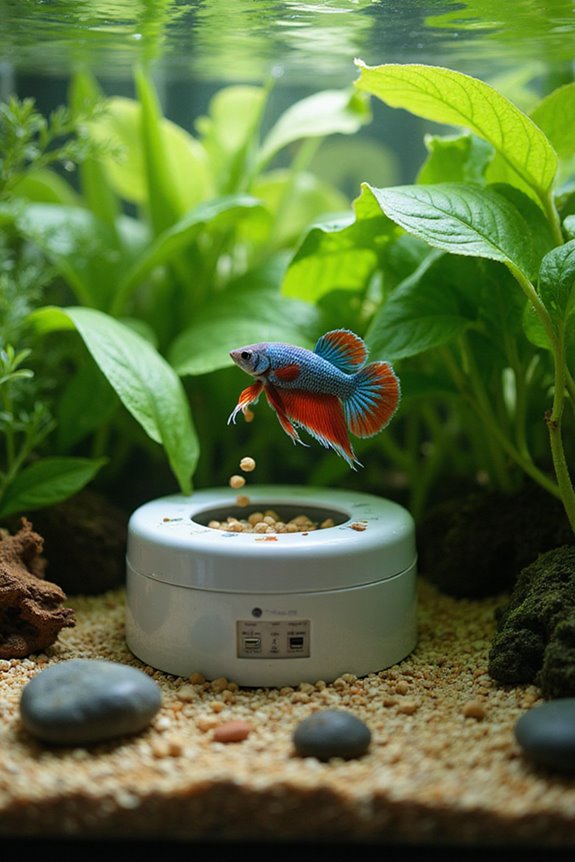
When planning for absences, it’s important to establish effective feeding practices to guarantee your betta fish remain healthy. I recommend setting consistent feeding schedules, ideally once or twice daily, at the same times to create a routine. Use small meal portions, about 4-6 pellets, to prevent overfeeding and water pollution. If you’re leaving for more than a few days, consider asking a reliable caregiver to follow your established routine. Pre-measure daily meal portions and provide clear instructions on feeding. Avoid leaving uneaten food in the tank, as it can decay and harm water quality. Finally, verify your tank’s water conditions are stable before you leave, as this will support your betta’s health during your absence.
The Importance of Tank Maintenance
Tank maintenance is vital for keeping your betta fish healthy and thriving. I perform water changes of 10-25% every 2-4 weeks to guarantee optimal water quality. Full water changes are discouraged because they disrupt the beneficial bacteria essential for tank cycling. In a 5-gallon tank, I change 1-2 partial cycles weekly and do a full change monthly, depending on conditions. I regularly test water parameters to monitor ammonia and nitrate levels, guiding my maintenance actions. Cleaning the tank involves using soft sponges and hot water for decorations, while avoiding soaps that could harm my fish. I check filter media monthly to maintain cleanliness and confirm the heater operates within the ideal temperature range for my betta. Regular maintenance supports a balanced ecosystem.
Managing Health Through Fasting
Managing health through fasting can be an effective strategy for maintaining the well-being of your betta fish, especially if you notice signs of digestive issues. Implementing periodic fasting every 7-10 days promotes fasting benefits such as improved digestive health. During these fasting periods, I recommend keeping the tank clean and ensuring ideal water conditions. If your betta shows signs of bloating or constipation, consider fasting for one to three days. This approach helps clear the digestive tract and prevents waste buildup. Always monitor your fish closely, as sick or stressed bettas may struggle with fasting. After the fasting period, resume feeding with high-quality pellets or frozen foods to support recovery and nutrient absorption.
Observing Betta Behavior Post-Fasting
Observing betta behavior after a fasting period is important to gauge their recovery and overall health. I’ve noticed that during fasting, bettas often become lethargic, resting more at the bottom of the tank or near decorations. After a fast, I look for behavioral changes like decreased swimming vigor or unusual body posture. It’s common for them to stay near the surface, taking breaths rather than exploring. When offering food, I watch their appetite closely; short fasts usually result in quick feeding recovery, while extended fasts can decrease their willingness to eat. Keeping an eye on stress indicators, like flared gills, is essential for ensuring their health. Gradual reintroduction to food helps them bounce back effectively.
Best Practices for Betta Fish Care During Extended Absences
When planning for an extended absence, ensuring your betta fish remains healthy and well-cared for takes some preparation. I recommend enlisting a trustworthy friend or relative to help with caregiver responsibilities. Provide them with clear, written instructions outlining the feeding schedules, suggesting 4–6 pellets per day. Pre-measuring food in a weekly pillbox can simplify this process. Before leaving, perform a partial water change of 15–25% and check all equipment, ensuring filters and heaters are functioning correctly. Maintain a stable water temperature around 78–80°F. After returning, test water parameters and perform necessary water changes. Finally, avoid introducing new tank mates or making changes to the environment right before you leave to reduce stress for your betta.
Frequently Asked Questions
Can Betta Fish Eat While Fasting?
When it comes to betta behavior, they shouldn’t eat while fasting. I’ve noticed that fasting effects can help with digestion, but allowing them to eat during this time can lead to stress or health issues.
How Does Stress Affect Betta Fish During Fasting?
During fasting, I’ve noticed stress symptoms in my betta, especially after three days. The fasting duration directly impacts their health, increasing vulnerability to diseases and causing lethargy if prolonged beyond what’s safe.
What Signs Indicate a Betta Fish Is Starving?
When it comes to knowing if your betta’s in trouble, keep an eye out for hunger symptoms. They’ll show increased activity, distinct feeding behaviors, and even visible changes in appearance that scream for attention.
Can I Feed Bettas Before a Fasting Period?
Absolutely, I always focus on my betta’s feeding habits before fasting. It really enhances their health. Incorporating a varied diet guarantees they gain fasting benefits, like improved digestion and reduced bloating when fasting occurs.
How Often Should I Feed My Betta Fish Regularly?
I recommend a feeding schedule of once or twice daily for my betta fish. Portion control’s essential; I only give 2-4 pellets per meal to keep their health in check and avoid overfeeding.


